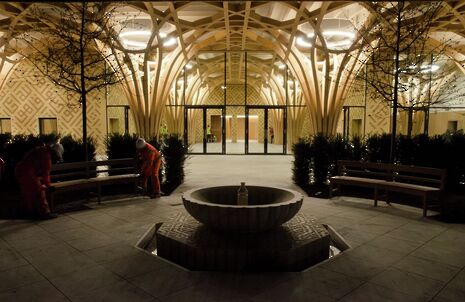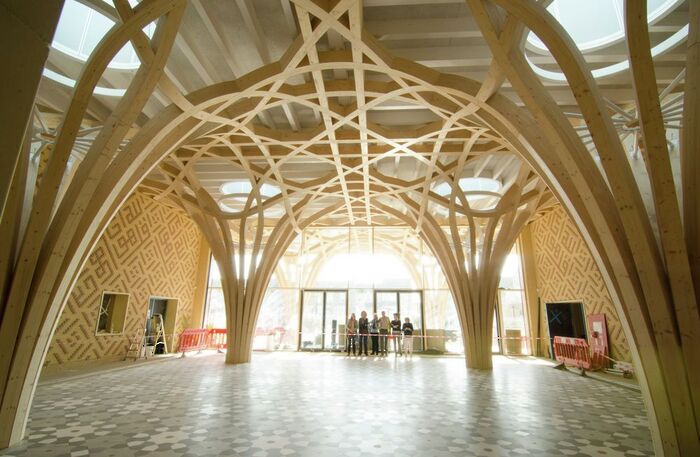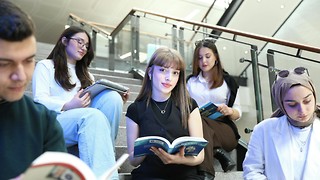‘I’ve ended up praying in a corner in a stairwell’: The limited provision of non-Christian prayer spaces across Cambridge
A Varsity investigation reveals limited availability of non-Christian prayer spaces across the University

A Varsity investigation has found inconsistent provision of prayer spaces between Cambridge colleges, in addition to concerns about the location of prayer spaces within University departments.
Several Muslim students have independently expressed concern to Varsity about their ability to access a prayer space. A Muslim student, who wished to remain anonymous, said that the lack of prayer space in the Engineering Department meant that she has often “ended up praying in a corner in a stairwell or empty corridor, for lack of a more appropriate space”. She suggested that all departments assign “just a little room that’s quiet and empty for an hour or two each day” in order to avoid this problem.
College chapels are heavily oriented towards Christianity, with 27 of 28 college chapels following Church of England teaching. St. Edmund’s is the only exception amongst College chapels, following Catholic scripture due to the College’s origins as a non-University institution for Catholic students matriculated in other colleges.
One student contextualised the lack of prayer space in their college within wider facilities, saying “it’s a shame as prayer and spirituality are considered in many ways essential for emotional and mental wellbeing, the college provides facilities for almost every activity including refurbished bar, but does not seem to consider the possibility that there may be students who need space for quiet reflection/prayer.”
Data obtained by Varsity through Freedom of Information requests shows that only five colleges — Fitzwilliam, Peterhouse, Queens, St. John’s and Trinity — have a prayer room which is independent of their college chapel.
19 of 31 Cambridge colleges have no provision for a permanent prayer space independent of a college chapel. The remaining colleges provide spaces by offering temporary use of rooms for prayer and meditation.
Several colleges — Churchill, Emmanuel, Lucy Cavendish, Pembroke and Girton — provide an alternative space, such as a ‘meditation room’ or ‘quiet room’ which is not designed for prayer but is available for that purpose if needed. Meanwhile, Downing, Hughes Hall, Murray Edwards and Robinson claim to create a prayer space if one is requested. Clare, Downing, Jesus and Girton emphasised that their college chapel is available for students of all faiths.
A University spokesperson told Varsity that the University “provides a number of prayer and reflection spaces across the city, which are available for non-Christian worship.”
Three colleges – Christ’s, Clare and Downing – are currently discussing the possibility of creating a prayer room. Churchill and Sidney Sussex have both previously discussed the possibility of introducing a prayer room, this did not come to pass for either college.
In the last academic year, Sidney Sussex made “enquiries… among neighbouring chaplains to see if there was any interest in a jointly supported prayer room that several Colleges could run together”, but ‘no interest’ was returned, according to a spokesperson from the college.
Religious societies have offered differing perspectives on prayer space provision within University buildings. The Bahá’í Society are positive about the north-west Cambridge development but criticise the lack of prayer spaces in University buildings in central Cambridge, whilst the Buddhist society request “an accessible location [which] can make… praying/meditation easy and continuous, so we suggest a quiet place at a central location, possibly at the University Centre building.”
University guidelines on the use of facilities for worship and prayer emphasises that “a number of rooms are made available by the University for its students, staff and authorised visitors with the primary purpose of providing a safe, clean and inclusive place for worship, celebration or meditation. No particular group has an exclusive right to use such a room or facility at any time and all users have an equal right to access the facilities.”
The University provides a detailed list of Cambridge’s places of worship outside of university buildings. However, several religious societies claimed that their nearest faith building is difficult to access. Sikh Society explained that “the nearest Gurdwara is very small and in the next town, so it can be difficult to get there sometimes” whilst the Buddhist Society claim that members ‘normally pray/meditate in the University building as the nearest Buddhist Temple is on Mill road and quite difficult to get to’.
Muslim students also spoke of logistical difficulties of accessing prayer spaces throughout the day. Yusuf Uddin, a second year HSPS student said: “If you don’t study or have lectures near/in Sidgwick or the Chemistry department [which have prayer rooms] then tough luck. [It] can be hard to access these prayer rooms especially when some people only have half an hour breaks in between lectures, practicals and supervisions”.
Zuheir, a PhD engineering student, said that “travelling three times a day from the engineering department to Sidgwick site is impractical and disrupts the flow of my work. I believe people with back-to-back classes don’t even have the privilege to do that, especially during winter”.
A University spokesperson told Varsity that the University aims to ensure that prayer spaces are “located at – or within a reasonable walking distance of – its main centres of study.”
Thilal Halimah, a Muslim PhD student at Wolfson called on the University to be more proactive in providing prayer spaces. She asked that Colleges do “’not wait for students to turn up and ask for quiet spaces for prayer, [but] rather to designate appropriate rooms for this purpose.”
The former President of Cambridge University Islamic Society, Dawud Afzal, emphasised that “members of the society do prefer to pray in prayer spaces within university buildings simply due to the fact that the faith buildings are too far from where lectures are held. As you may know, Muslims pray five times a day and thus to have to travel well out from lecture sites to a faith building would not be possible.”
Islamic Society emphasised that “the university is doing everything they can to accomodate for Muslim Students this year” and spoke positively about their main prayer space on the Sidgwick Site and the Multi-Faith and Reflection Centre on the West Cambridge development.
Halimah argued that the provision of prayer spaces is not just about recognising the desire to pray but also to enable secluded reflection “away from studies and people” as well as group discussions on spiritual topics.
Halimah complained that rooms in Wolfson College which she could book to pray in are not designated for non-Christian prayer, so “may be inappropriate considering they have portraits and posters which are distractions to the person performing prayer.”
She has also encountered problems in the Education faculty. The student was “advised by the receptionist two years ago that I should find a free room on my own by checking the screens. This hasn’t worked out so well as there were days when all rooms were booked and so much of my time spent walking around Mary Allen Building and Homerton looking through the screens to find a free room. Some people also book rooms but do not disclose this on the display screens so when they interrupt me, I have no choice but to stop my prayer (something I only usually do in an emergency) and leave the room.”
She continued that “some security staff appeared to not know anything about prayer and walked in talking to me about locking up, which I found uncomfortable as I couldn’t respond… but at the same time, I was conscious of coming across as rude or strange for not being able to respond while praying.”
A spokesperson for the Faculty of Education was apologetic to the complaints. They insist that interruptions were “accidental and there was no intention to disturb the student’s prayers or make the student feel uncomfortable.”
In response to interruptions during prayer, several Muslim students approached the Faculty of Education to request a designated prayer room. The students were then pointed toward an available classroom and given a “laminated paper reading ’Prayer space – do not disturb”, which they are required to borrow from reception every time they wish to pray.
The Faculty of Education insist that they provide prayer space when it is requested, but signs are provided instead of a designated room because rooms within the Faculty “are in regular and changing use according to teaching needs”. The signs are intended to “inform fellow faculty members when a room is in use for prayer.”
The Faculty explains that it is not possible to provide a permanent, designated prayer room due to lack of space. A spokesperson told Varsity that “the Faculty – a community of around 1,000 people – does not have enough space to accomodate all of its 200 academic staff, some of whom have to hot-desk around the building”.
Whilst the Multi-Faith and Reflection Centre was widely praised by students, some students questioned how the mandatory induction makes the space unsuitable for immediate use.
Last year, a Varsity investigation found failings in how Cambridge dealt with requests for special exam arrangements by some religious students, causing them additional stress or incentivising students to diverge from their usual religious practices.
 News / Local business in trademark battle with Uni over use of ‘Cambridge’17 January 2026
News / Local business in trademark battle with Uni over use of ‘Cambridge’17 January 2026 News / Cambridge bus strikes continue into new year16 January 2026
News / Cambridge bus strikes continue into new year16 January 2026 Comment / The (Dys)functions of student politics at Cambridge19 January 2026
Comment / The (Dys)functions of student politics at Cambridge19 January 2026 Comment / Fine, you’re more stressed than I am – you win?18 January 2026
Comment / Fine, you’re more stressed than I am – you win?18 January 2026 News / News in Brief: cosmic connections, celebrity chefs, and ice-cold competition18 January 2026
News / News in Brief: cosmic connections, celebrity chefs, and ice-cold competition18 January 2026










